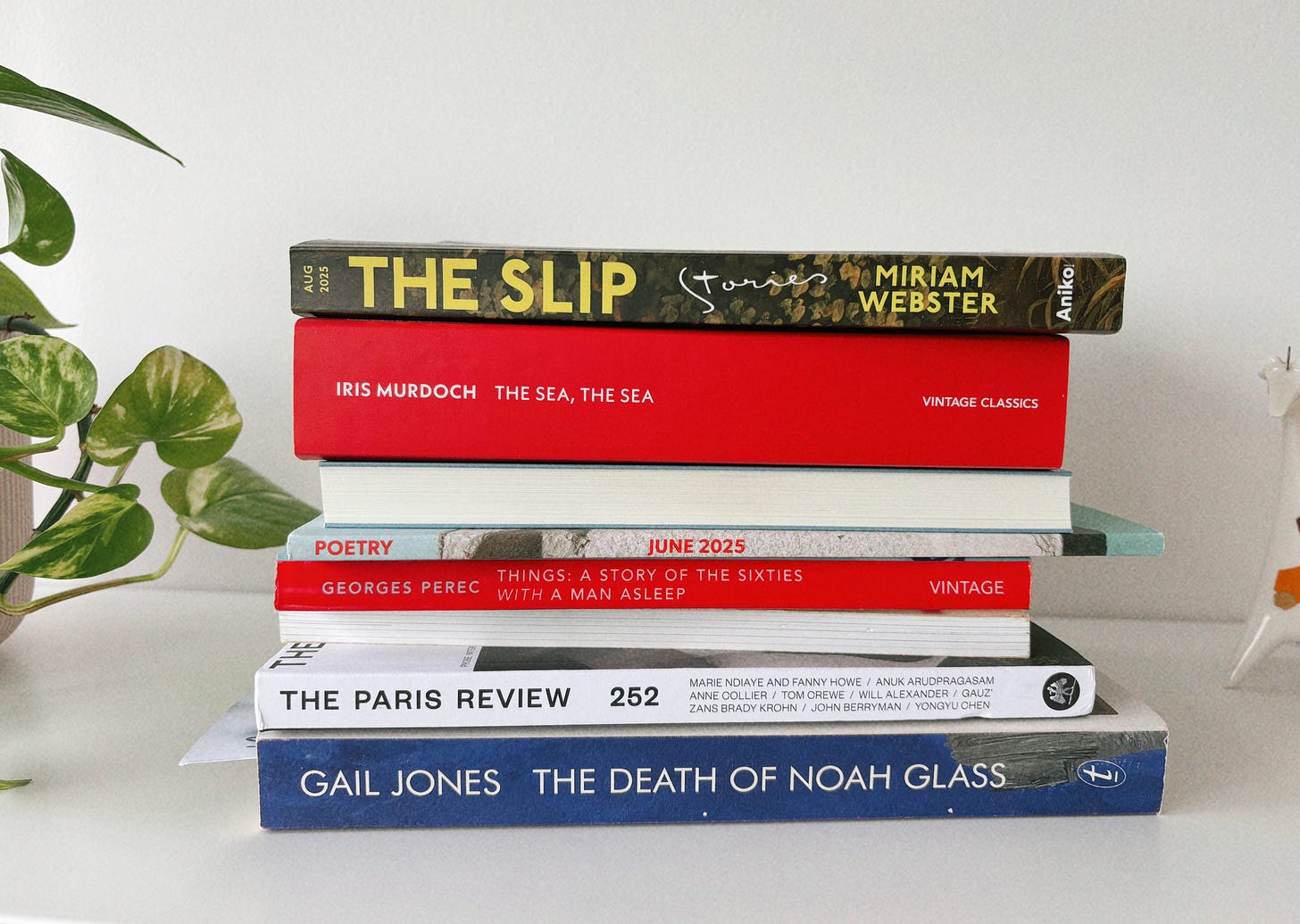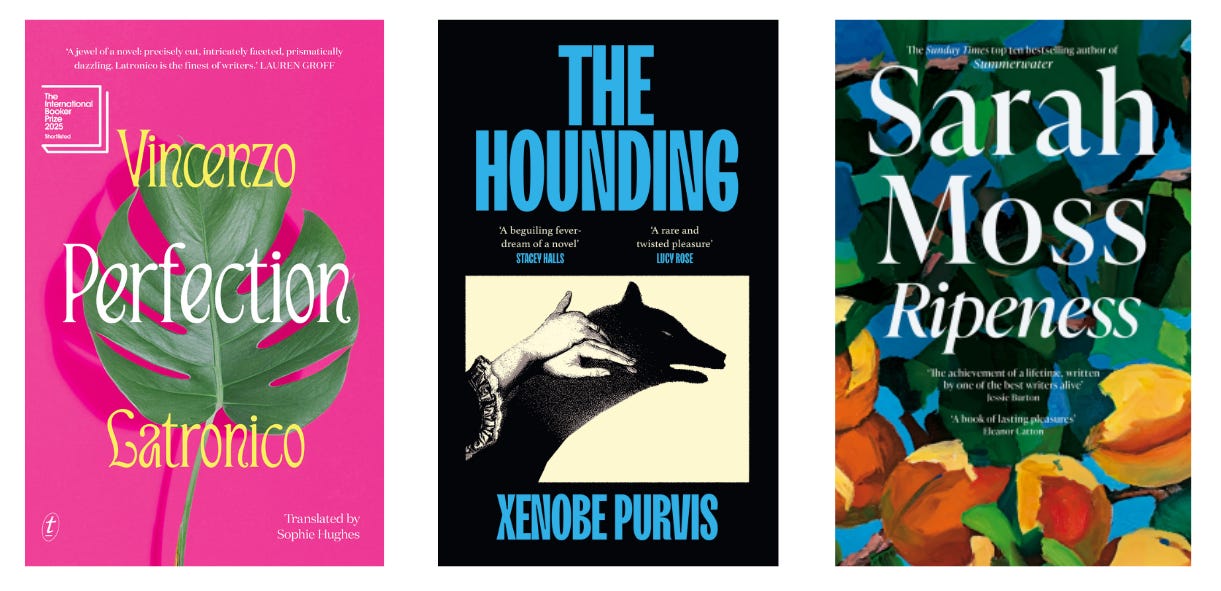What I read in July
Lessons learned: turn your phone off at 9pm
Hello!
At the beginning of the month, I set up my phone to turn everything except emergency phonecalls1 off after 9pm, and I’ve read 8 books this month. Who knew that when you look yourself out of your doomscrolling, the TBR gets more inviting??
Books
Perfection, by Vincenzo Latronico (translated by Sophie Hughes) and Things: A Story of the Sixties, by Georges Perec (translated by David Bellos)
I deliberated over PERFECTION for a while, and then Jia Tolentino was on TikTok recommending books, and it was the push I needed. It’s inspired by Georges Perec’s THINGS: A STORY OF THE SIXTIES — critiquing consumerism via a 1960s couple in Paris — transposed onto a millennial couple, living in Berlin and working at their Creative jobs. I highlighted huge chunks of this, read it in two sittings, and then I went to the library to hunt down the Perec. Reading both, I have to admit, has lessened the effect that PERFECTION had on me, but I do think it’s a very clever way to have skewered our current obsessions and media consumption. Turns out, they might not have had Instagram distorting reality in the sixties, but keeping up appearances doesn’t get a time stamp.
The Hounding, by Xenobe Purvis
I absolutely ATE THIS UP. It’s set in 18th Century England, in a dry summer as the haymaking season is about to begin. On one side of the river, Pete Darling is in the alehouse, lamenting the lack of rain, worrying that no one will need his ferrying services if the riverbed dries up much more, awaiting his impending wedding day, and quietly hating the freedom and ferocity of the five young Mansfield sisters, living across the water with their grandfather, in a farmhouse on the edge of the village. There’s something strange about the girls, and Pete is going to find out what it is. For one thing, he’s heard them barking.
So, so great. If you want witch-hunting vibes with a twist, this is perfect. (Also, I have to shout out how good the the very literal names of the farm animals are: Catchrat and her kittens, and dairy cow Fillpail. It seems a small thing, but it does a lot to give a sense of how straightforwardly Joseph Mansfield, the girls’ grandfather, runs his house. Surely girls brought up here wouldn’t actually be turning into dogs, would they?)
Ripeness, by Sarah Moss
New Sarah Moss is always exciting, and her latest is SO good.
Set partly in the 1960s and partly in the mid-2020s, Moss weaves Edith together from different perspectives, alternating chapters in first and third person, at either end of her adulthood. Booksmart seventeen-year-old Edith has been sent to Italy as help for her sister Lydia, self-exiled at a time when an unmarried pregnant woman had limited options; Edith is bound for Oxford, and spends the first half of her time at the villa testing out Italian-friendly shortenings of her name, making friends with the housekeeper, and learning crucial differences between her life on her father’s farm and the life of her professional ballerina sister. Years later — Edith is in her seventies, happily divorced and living alone in Ireland, a foreigner at a time when tensions between the “right kind” and the “wrong kind” of foreigners abound, when her friend Maebh receives a letter from a lost half-brother, and asks for Edith’s help.
Throughout, Edith is constantly rubbing up against her own family’s history and reconciling her relationships with it; not just Lydia and her unwanted baby, but also the deaths of her Jewish grandmother and aunt during the holocaust before either Lydia or Edith were born; their mother’s trauma and resulting inability to stay put; Edith’s Irish ex-husband, their son Pat and the conflict of the choices Edith has made over the course of her marriage; and the burgeoning relationship with the German lover who makes the bed especially for her. Edith never really belongs in either narrative — in the first, she’s an outsider to Lydia’s glamorous life in the Arts, naive to what her sister is going through, and thrust suddenly, briefly, into the role of mother. In her later life, she’s always “English”. Despite her heritage, despite the decades she’s lived in Ireland, and highlighted by Maebh’s half-brother finding connection to “where he’s from”, Edith’s status is always that of an observer.
As always, Moss’ writing is layered and luxe, and she scatters little details through her characters to bring them to life, making it easy to be completely immersed in both parts of Edith’s story. Jumping from the past to the present never feels like a jolt, and as more of Edith’s life is revealed she becomes — even if just to herself — the main character she’s suspected herself to be all along.
Other things: I finished Shon Faye’s excellent LOVE IN EXILE; raced through THE DEATH OF NOAH GLASS, by Gail Jones, which I’d picked up at the Lifeline Book Fest; *loved* Miriam Webster’s debut short story collection THE SLIP (I picked up a commission to review it, so I’ll save properly reviewing it here until next month!); and tracked down a copy of Iris Murdoch’s THE SEA, THE SEA for September’s book club, which was much more difficult than I’d expected.
Online reads
Maybe unexpectedly, AI really is making us stupider
Via someone on my Notes feed(?) (sorry!), Audre Lorde’s “The Transformation of Silence into Language and Action” (I also re-read “The Uses of the Erotic” early on in the month as part of a poetry course and it’s so beautiful)
Jhumpa Lahiri’s short story, JUBILEE, for this month’s issue of The New Yorker
I’m planning on catching up on some Netgalley bits next, and then starting on some of the Booker longlist. I’ve only read AUDITION by Katie Kitamura, so I’ve got a few to pick from!
Terri-Jane x
"By “emergency phonecalls”, I obviously mean a) my mum on her way to the dog park, on a -9hr time difference, or b) my mum on her way home from the dog park, on a -9hr time difference.







Some great sounding books here. I can't wait to read the Sarah Moss, especially.